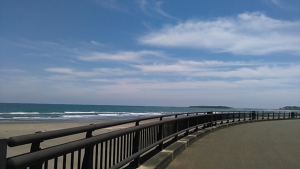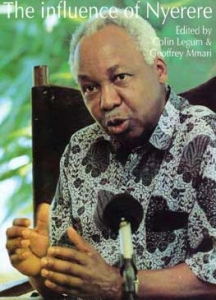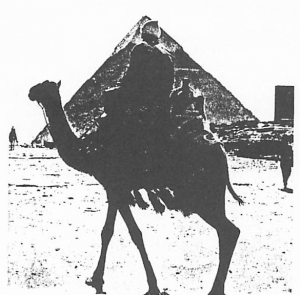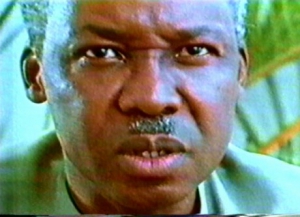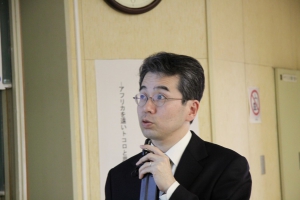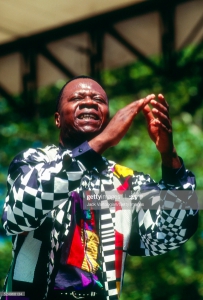<連絡事項>
* 課題提出:出来るだけ7月27日(月)授業時までにWebclassで提出。遅くとも29日(水)までに。(次回画面を共有して、Webclassでの提出の仕方を確認出来るように準備しときます。)
* 授業日程確認:
11回目→7月20日(月):映像「アフリカシリーズ」、『金のフレーズ』
12回目→7月27日(月):映像「ルーツ」、『金のフレーズ』
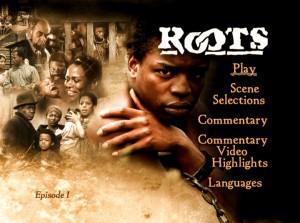
13回目→7月29日(月):第二次世界大戦後:映像「アフリカシリーズ」、『金のフレーズ』

14回目(最終回)→8月3日(月):まとめ
授業では
* 課題提出日、課題の再確認
* 発表:The colonization of Africa: Precolonial Africa(恒吉さん)、西アフリカの王国(戸高さん)、トワレグ人(小島さん)、カイロ(梅山さん)、発表:The colonization of Africa: The first colonialists(田代くん)
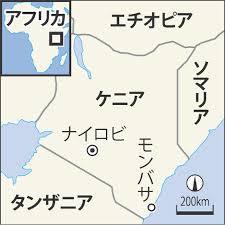
みんなそれぞれしっかりと調べて発表してくれました。ほんとはすぐあとに映像を見てもらえればより具体的にイメージ出来たと思うけど、映像は次回に。何とか全員発表してもらえてよかったです。
二つのクラスともほぼ全員が授業に来てくれてるけど、すごいなあ。僕の大学の時とえらい違いや。
もうあと4回と先も見えて来ました。何かばたばた授業を始めて、週に7コマの授業をするだけでアップアップ、何とかあと一月で一息つけるんやろか。
出来れば、最終の週までに成績をつけて、授業が終わったあとは、今回の感染症騒ぎで中断することになって小説を書き上げて、9月末の新人賞に応募出来ればええけどな。
→The colonization of Africaの日本語訳
次回は
* 授業についてのコメント数人(続き)
* 「アフリカシリーズ」の映像

* 『金のフレーズ』①の解説→ブレイクアウトセッションで確認し合い、出来れば覚え合う。
授業で、また。
Precolonial Africa, The first colonialistsの日本語訳
Africa and Its Descendants (アフリカとその末裔)
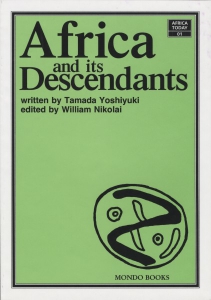
Chapter One: The Colonization of Africa(アフリカの植民地化)
PRECOLONIAL AFRICA 植民地化以前のアフリカ
Africa has been of great importance to the development of mankind. It has been found that the earliest beings able to make tools once lived in the Rift Valley in East Africa.
アフリカはこれまで人類の発展のためにとても重要でした。ごく初期の頃に道具を作るが出来た人たちが、かつて東アフリカのリフトバレー(大地溝帯)に住んでいました。
A big leap forward was taken when man learnt to sue iron for tools. Another big step was taken when cultivation started on a large scale. Large scale cultivation in Africa began in about 2000-3000 B.C. in both West Africa and Ethiopia.
人々が道具を作るために鉄を精錬するようになって、ひとつの大きな文明の飛躍がありました。大きな規模で耕作が始まって、更に飛躍を遂げました。約紀元前2000年から3000年頃、西アフリカとエチオピアの双方で、アフリカでは大規模な形での耕作が始まりました。
Between the years A.D. 700 and 1400 Europe developed rapidly. But for all this time European society was in many ways inferior to that of its African neighbours. Cairo was the foremost trade centre in the world and gold was used as the means of payment. Some of this gold was brought from West Africa, and some from Central Africa. The gold of Africa kept world trading going. World trade was stimulated by the spread of Islam. The gold from Zimbabwe was transported from the interior by Muslim middlemen to the African East Coast.
700年から1400年の間に、ヨーロッパは急速に発展しました。しかその期間の間も絶えず、ヨーロッパ社会は様々な点で、近隣のアフリカ諸国よりも劣っていました。カイロは世界の最大の貿易拠点で、金が支払いの手段として使われました。このとき使われた金は、西アフリカや中央アフリカからきたものもありあました。アフリカからの金が世界の交易を発展させ続けました。世界貿易はイスラムの広がりによって刺激を受けました。ジンバブエからの金はイスラム教徒の仲買人によって内陸からアフリカの東海岸へ運ばれました。
In West Africa, too, long-distance trade gave birth to new and powerful societies. The West African kingdoms were ruled by kings who appointed local noblemen to collect taxes from the peasants.
西アフリカでは、また、長距離貿易が、新しくて強力な社会を生み出しました。西アフリカの王国は王によって統治され、王に指名された地方の貴族が農民から税を集めました。
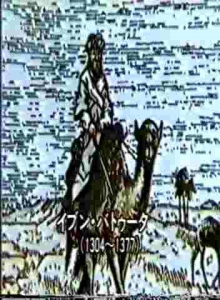
西アフリカの王国を訪れたポルトガル商人イブン・バトゥータ
Not only in West Africa, but also in Central Africa a centralized organization of society emerged on the basis of surplus production, trade and a growing population.
西アフリカだけでなく、中央アフリカでも、余剰生産と交易と人口増加を基礎にして、中央集権社会が現れました。
Parallel to the development of large kingdoms in Africa many groups of people learnt to control nature without kings and kingdoms. Their political systems may be called 'village rule.’
アフリカでは、大きな王国の発展と併行して、多くの人々の集団は王や王国なしに自然を制御するようになりました。その人たちの政治制度は “村落共同体支配” と呼べるかも知れません。
In Africa, as elsewhere, migrations of cattle-raising people took place when they had to find new pastures, and new places to live for a growing population.
アフリカでは、他の所と同じように、人口が増えて新たな牧草地を探し、生活するための新たな土地を見つけなければならなくなった時、遊牧民の移住が始まりました。
THE FIRST COLONIALISTS 最初の植民地支配を目論んだ人達
Portuguese adventures were the first Europeans to 'discover’ Africa south of the Sahara. The first voyages along Africa’s west coast were little more than an extension of the piracy. The Portuguese took away people from the coasts they plundered and brought them home as slaves. As yet slave trade and economic exploitation were on a small scale.
ポルトガルの探検家がアフリカサハラ以南のアフリカを最初に「発見した」ヨーロッパ人でした。アフリカの西海岸に沿った最初の航海は、海賊行為の延長に過ぎませんでした。ポルトガル人は略奪行為を行なった海岸地域から人々を連れ去り、奴隷として母国に連れて帰りました。しかしそれでも、奴隷貿易と経済的な搾取の規模は小さなものでした。
They started to buy gold directly at the coast. In time they also wanted to find a sea route to India. Their aim was to take away from the city-state of Venice their control over the profitable spice trade with the East Indies.
ポルトガル人たちは海岸線で、直接金を買い始めました。やがてはインドへの海上ルートも発見したいと望んでいました。その人たちの目的はベニスの都市国家から、儲けの多い東インドとの香辛料貿易の支配権を奪うことでした。
Portugal wanted to start trade by exchanging goods with East Africa. But the project failed as the goods that Portuguese had to offer were inferior to those of the East African tradesmen. The Portuguese seafarers and merchants then decided to achieve for themselves the East African trade monopoly by force. With their superior arms the Portuguese managed to destroy the East African civilization.
ポルトガルは東アフリカと商品を交換することによって貿易を始めたいと思っていました。しかし、ポルトガルが持っていった商品が東アフリカの貿易商人の扱う商品よりも劣っていたために、その目論見は失敗しました。その時、ポルトガルの船乗りと商人は、武力を使って自力で東アフリカの貿易を独占しようと決めました。ポルトガル人は、優れた武器を使って辛うじて東アフリカの文明を破壊することに成功しました。
In Western history Vasco da Gama, d’Almeida, and Tristan da Cunha have been estimated as 'great discoverers,’ but they were nothing but destroyers for Africans. A Germany who was present when d’Almeida destroyed Kilwa gives us the following eyewitness report:
“In Kilwa there are many strong houses storeys high. They are built of stone and mortar and plastered with various designs. As soon as the town had been taken without opposition, the Vicar-General and some of the Franciscan fathers came ashore carrying two crosses in procession and singing Te Deum. They went to the place, and there the cross was put down and the Grand-Captain prayed. Then everyone started to plunder the town of all its merchandise and provisions. Two days later the city was set on fire."
西洋の歴史では、ヴァスコダ・ガマやダルメイダやトゥリスタオ・ダ・クンハはこれまでずっと「偉大な発見者」として評価されて来ましたが、アフリカ人にとってその人たちは破壊者以外の何ものでもありませんでした。ダルメイダがキルワを破壊した時に立ち会ったあるドイツ人は、次のような目撃証言をしています。
「キルワでは2階や3階の高いしっかりとした家がたくさんあります。家は、石とモルタルと漆喰で出来ていて、様々な模様をしています。町が抵抗もなく占領されるとすぐに、司教総代理と何人かのフランシスコ会の神父が上陸をして、一列になって十字架を運び、賛美歌を歌いました。それからその場所に行き、十字架が降ろされ、総督が祈りをささげました。それから、その町の全ての商品と食料品を略奪し始めました。2日後、街に火をつけました。」
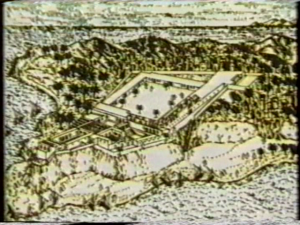
栄えていた商業都市タンザニア沖合の島キルワ、1505年廃墟に
The main interest of these first colonialists was in spices, cloth, gold, and ivory. They dominated the sea but on land only some narrow strips of the coast. Other countries soon began to compete with the Portuguese for the trade with the East; first the Dutch, then the English and the French gained control over this rich trade.
こうした植民地支配を目論んだ人達の主な関心は、香辛料と布と金と象牙でした。その人達は海を支配しましたが、陸では海岸線の岸の狭い僅かな地域を支配しただけでした。やがて他の国々も東洋との貿易を求めてポルトガルと競争をし始めました。最初にオランダ、次にイギリスとフランスがこの豊かな貿易の支配権を手にすることになりました。
THE SLAVE TRADE 奴隷貿易
The European conquest of South America suddenly changed the character and importance of the slave trade. With brutal force the prospering cultures of Peru, Bolivia and Mexico were stamped out by the Spanish conquerors and their silver and gold were stolen. Many Spaniards who set out for this Eldorado found no metals but settled as farmers.
ヨーロッパ人が南アメリカを支配したことで、奴隷貿易の特徴と重要性が一変しました。ペルー、ボリビア、メキシコの繁栄した文化はスペインの侵略者に力ずくで踏みにじらされ、金や銀が盗まれました。理想郷を求めて出発したスペイン人たちは金銀を見つけられませんでしたが、そのまま住み着いて農民になりました。
In 1518 a Spanish ship brought the first cargo of Africans directly from Africa to America. This was the start of a trade in slaves which was to continue for three and a half centuries and to bring millions of Africans to America.
1518年、スペイン船が初めてアフリカ人の積み荷を直接アフリカからアメリカに連れて行きました。これがその後3世紀半にも渡って続き、何百万人ものアフリカ人をアメリカに連れ出すことになる奴隷貿易の始まりでした。
The merchants’ profits and the products from America were exchanged in Europe for guns and cloth which were brought to Africa and exchanged for slaves. These humans were sold in America where they produced the goods to be brought to Europe. This was the so-called 'triangle trade.’ The riches of the capitalists grew while Africa suffered.
奴隷商人の利益と、アメリカからもたらされた産物は、ヨーロッパでアフリカへ連れて行かれて奴隷と交換される鉄砲や布に交換されました。これらの人間はアメリカで売却され、そこでヨーロッパに運ばれる商品を作り出しました。これが所謂「三角貿易」でした。資本主義者たちの富が増えて、アフリカが被害を受けました。
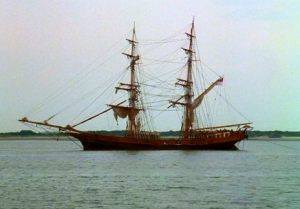
奴隷船(帆船)
European, above all English and American capitalists had gained enormous profits from the trade in slaves and the work performed by the slaves. Slavery was an essential part of the international capitalist market. By this trade the first large-scale collection of wealth was accumulated to speed up the development towards capitalism. The 'triangular trade’ was one of the foundations of the Industrial Revolution in Europe.
ヨーロッパ、とりわけ、イギリスとアメリカの資本家たちが奴隷貿易と奴隷が行なう労働から莫大な利益を手に入れました。奴隷制は国際資本市場で重要な役割を担っていました。この貿易によって、大規模な初期の富の集積が行なわれ、資本主義への発展の速度を加速させました。「三角貿易」はヨーロッパの産業革命の基礎の一つでした。
For Africa the consequences of the slave trade were ruinous, not only in the terms of the boundless suffering of the millions who were taken as slaves, and their descendants, but also for those left behind.
アフリカにとって、奴隷貿易によってもたらされたものは、奴隷として連れ出された何百万もの人々とその子孫の際限ない苦しみという意味だけではなく、後に残された人たちにとっても、壊滅的でした。
クラス名簿(再掲載)2020年前期 英語 Ra1(2)クラス名簿(31名)
| 30170030 |
井戸 颯人 |
イド ハヤト |
| 30200049 |
池ノ上 将基 |
イケノウエ シヨウキ |
| 30200092 |
梅山 愛梨 |
ウメヤマ アイリ |
| 30200100 |
押領司 尚美 |
オウリヨウジ ナオミ |
| 30200137 |
尾崎 ちひろ |
オザキ チヒロ |
| 30200186 |
加藤 大地 |
カトウ ダイチ |
| 30200205 |
川越 晴登 |
カワゴエ ハルト |
| 30200232 |
北村 詩歩 |
キタムラ シホ |
| 30200250 |
串間 怜央 |
クシマ レオ |
| 30200278 |
小島 楓華 |
コジマ フウカ |
| 30200322 |
迫田 凜々香 |
サコダ リリカ |
| 30200335 |
佐々木 ルナ |
ササキ ルナ |
| 30200423 |
田代 直哉 |
タシロ ナオヤ |
| 30200447 |
恒吉 実於 |
ツネヨシ ミオ |
| 30200454 |
角田 楓 |
ツノダ カエデ |
| 30200461 |
堂下 つばさ |
ドウシタ ツバサ |
| 30200506 |
時松 桃花 |
トキマツ モモカ |
| 30200533 |
戸高 みなみ |
トダカ ミナミ |
| 30200551 |
永友 阿耶里 |
ナガトモ アカリ |
| 30200603 |
東久保 光汰 |
ヒガシクボ コウタ |
| 30200627 |
平井 優季 |
ヒライ ユキ |
| 30200676 |
福瀬 一真 |
フクセ カズマ |
| 30200713 |
藤田 涼 |
フジタ リヨウ |
| 30200728 |
淵脇 紅南 |
フチワキ アカナ |
| 30200731 |
古田 紋子 |
フルタ アヤコ |
| 30200742 |
本田 拓哉 |
ホンダ タクヤ |
| 30200766 |
松田 美月 |
マツダ ミヅキ |
| 30200777 |
松元 彩夏 |
マツモト サヤカ |
| 30200816 |
御沓 帆志 |
ミクツ ホシ |
| 30200834 |
宮脇 駿介 |
ミヤワキ シユンスケ |
| 30200870 |
山田 凌平 |
ヤマダ リヨウヘイ |
